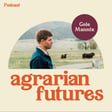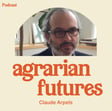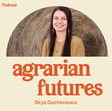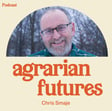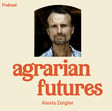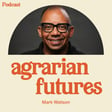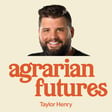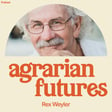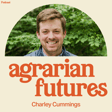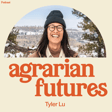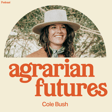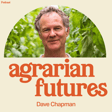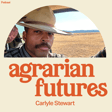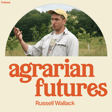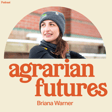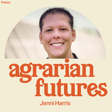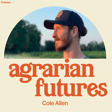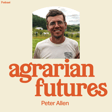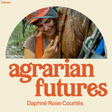Wendell Berry's Agrarian Ideals and Climate Solutions
00:00:00
Speaker
The idea of an agrarian, I think, is one of the most important things that everybody can start to think, like, what does this mean? What does it mean to be an agrarian? This is from Wendell Berry. I forget which book it's from. He was talking about the climate issue, right, in a changing world. And, you know, how do we go about cutting carbon emissions and these things? And he says the problem is it's become such a polarized endeavor, right? If you go into a small town,
00:00:24
Speaker
And you say, hey, we're going to go sequester carbon by doing these farming practices. You've lost them already because it's so highly politicized, right? But if you talk about increasing jobs per acre, if you talk about how do we keep the value of this stuff local? Well, what you've just done is you've captured the hearts and the attention and the imaginations of a local community.
00:00:44
Speaker
who would probably be opposed to that and largely those are some of the best climate solutions. How do we keep things local under the care of good people who care for the land and can do that in a very faithful way, right?
Introduction to Agrarian Futures Podcast
00:01:04
Speaker
You are listening to Agrarian Futures, a podcast exploring a future centered around land, community and connection to place.
00:01:13
Speaker
There's a lot of doom and gloom these days from climate change, deepening inequalities, and a profound crisis of meaning felt by many of us. In the media and from our politicians, we tend to hear that we need to do more of the same. More at tech, bigger markets, and faster growth.
00:01:31
Speaker
We think that there are answers that might be found elsewhere. I'm Emma Ratcliffe. And I'm Austin Unruh. And on the show, we chat with farmers, philosophers, and entrepreneurs reimagining our relationship to the land and to each other to showcase real hope and solutions for the future.
00:01:57
Speaker
Welcome, folks, to the Agrarian Futures podcast.
Meet Josh Payne: Transitioning Farmer
00:02:00
Speaker
And today we have my friend Josh Payne on the podcast. Josh, can we start out with just a little introduction of yourself and your farm? Yeah, so I'm Josh. I farm outside of Kansas City. And I farm with my sister and my family. We used to be a row crop farm. We used to basically just have corn and soy. I farm with my grandpa. I joined him when he was about 84.
00:02:25
Speaker
and still driving tractors and combines and so from there we learn to live with each other with all those great generational issues and now we don't do real crop stuff anymore we don't do corn and soy but instead we have tried to realize our farm we tried to move into chestnut trees as a cash crop and currently we have about eight hundred hair sheep.
00:02:44
Speaker
that is our primary income driver. So right now we have myself and my sister to full-time jobs on about 300 acres that we run. We have some more that we would love to tie into that because we love the ecological things that we're doing and we're just kind of waiting on there. So perfect. Perfect. Thank you, Josh.
00:03:01
Speaker
So let's dive in a little bit to the transition that you made from row crops to livestock. Can you tell me a little bit about why you made that decision and what the process looked like to make that transition?
From Row Crops to Livestock: Josh's Regenerative Journey
00:03:17
Speaker
The context of that story is maybe the most important of that. It's something that I think a lot of people are going to go through here relatively soon. And it's transitioning from one generation to the next. And so I'm farming with my grandpa.
00:03:29
Speaker
And basically I didn't really like it, right? We started off row crop farming. I'm not very mechanical. I don't fix things well. And that's kind of what you do in row crop farming is you have to be a mechanic because like your primary stuff is tractors and planters and stuff. And so I kind of did that and really didn't enjoy life for a while. It was one of those things that I didn't find much meaning. I just kind of like was on repeat mode in life.
00:03:53
Speaker
And so at some point in there, instead of transitioning from row crops into livestock, we actually transitioned into cover crops. We were into a continuous living cover row crop system. And that honestly was very much driven theologically.
00:04:10
Speaker
Um, a lot of my theology, a lot of like my, my life philosophy kind of changed. And I realized that life is really about bringing about regeneration and hope and healing and all those really good things that my conservative evangelical background kind of said, yeah, we don't go there, um, in those parts of our faith.
00:04:28
Speaker
So we moved into like a continuous living cover regenerative row crop farming. And then after that, I realized I was having all these issues. I thought it was food. My throat was swelling shut. I was getting to be at where I couldn't breathe and it was happening more and more often. And so the last harvest that we went through, I was having three reactions per week.
00:04:48
Speaker
the doctor said, Hey, you're gonna die of this eventually. So we talked to try to figure out what it was, we did a bunch of like gut microbiome testing. And turns out I my body doesn't eliminate toxins well. And so anytime I'm around a herbicide, my body just overflows and it overflows in my throat and I get
00:05:07
Speaker
constricts airways. And basically, if we didn't make a change, I would have died. So that was a really big issue. My grandpa, at this point, he was 91. He could sit and we could stick him up in a combine and he wouldn't get out for the whole day. But he could still kind of do stuff on the farm. And we realized this has to either change either go have to go back to teaching or we can change up stuff. So we
00:05:31
Speaker
did a bunch of research, we thought about cattle and then we kind of decided on sheep because sheep are really good economically and they eat a lot of weeds and they take care of stuff in ways that cattle just can't. So like honestly it was a big part of it was just physical health as a relationship to like the chemicals and herbicides that we were using in row crop and that's kind of in one of those layers.
00:05:55
Speaker
Josh, do I remember right that you would eventually wanted to integrate livestock as it was within the experience with the pesticides and that negatively affecting your personal health that kind of jump started the transition?
Health Challenges and Sustainable Practices
00:06:10
Speaker
Yeah, absolutely. I guess I would say we kind of caught the soil health bug, right? And the problem with the soil health bug is you start to think, okay, well, if conventional tillage to no till is a little bit better soil health, right? And then Oh, yeah,
00:06:21
Speaker
cover crops are good, but they're annual and they still require some herbicide, right? And so we started thinking, how do we continually just get deeper and deeper into the idea of healthy soil because it cleans water and it sequesters carbon and all those things that I grew to care more and more about, right?
00:06:38
Speaker
But the problem is, in annual production, you're always going to have to restart secession somehow, right? So we'd always have to use herbicide or use tillage, and that's just not good for soil. So the idea was let's move in the long term towards a perennial farm. So we had chestnuts planted and we alley cropped in between there. We grew corn and we grew soybeans in between the chestnuts as they were going so we could still make money on it, right?
00:07:02
Speaker
And then we knew, if we're going to follow the soil health idea, is that we need animals to be reintroduced. The biology that they introduced, the way that they can maintain nutrients on a farm without exporting as high a percentage. We knew that had to happen. But the thought was, my grandpa still has this vocation. He still has this life that he can still live. So we wanted to respect that and make sure that we didn't just kick him to the curb in that. And so really, what happened was the herbicide thing just made it urgent and made us say, we have to do this.
00:07:32
Speaker
How did your grandfather feel about this transition? Well, how does how does everybody feel about somebody like taking everything that you've done for your entire life and just say we're not going to do that anymore, right? He spent his entire life with the bulldozer taking out all the trees, right? And so, of course, we go back and we.
00:07:48
Speaker
Plant a whole bunch of trees at the exact same spot that he used to have an orchard right this whole north side had fences everywhere there a little ten or fifteen acre paddocks that just kind of fit with how the land was and of course we decided to put all that back and like he he was
00:08:05
Speaker
We had some arguments. Let's just say that there were some there were some words there that I probably can't repeat on this podcast. But the great thing about this is I think like this is something I think about often. We care for each other, even though we deeply disagree with each other. And it was kind of like both of us decided that we just weren't going to leave. Even if we disagree, we just weren't going to leave each other. Right. I think part of it's because he was getting older and couldn't leave anymore. But we just decided that we're going to stay here.
00:08:33
Speaker
And a lot of times those fights would just kind of dissipate. We come back and talk about them. We blow up again. We come back and talk about them. But just the consistency and almost the idea that we are here for you no matter what got us through that.
00:08:48
Speaker
interesting in telling that there was a lot of respect on your end for your grandfather, for him to still be farming and allowing him to still farm up until the pesticide issue where it became much more urgent to transition quickly.
Balancing Ecology and Family in Farming
00:09:05
Speaker
to be respectful of your grandfather and that this was still something that he could do even in his old age and feel like he could contribute and have something productive to do that I'm assuming gave him a lot of life and it gave him a lot of reason for getting up every morning.
00:09:22
Speaker
Yeah. And that's honestly one of the things we've tried to stay away from is, oh, the world is so divided. People think it should be organic. And so it has to just be that, or it should just be notes, or conventional, or whatever that might happen to be. And so
00:09:37
Speaker
And so for us, I fully believe that I shouldn't use chemicals in my farm. I fully believe that we should stay away from synthetic fertilizers, right? But at the same time, if that's just this completely black and white issue, I forget that there's people and there's soil and there's a community involved in this entire process. And if I just focus on that black and white issue that I think is right, then I don't know that I'm being faithful to a place. I'm not being faithful to a land or faithful to a town or my family.
00:10:06
Speaker
You might be a better steward of the land and the soil, but you might be a worse steward of your family and your relationships in that case. Yeah, exactly. And then if I don't kind of take care of those, if I don't take care of the family, then I'm going to lose the ability to take care of the soil as well. It's one of those things like they can't be divorced from each other, but so often they are.
00:10:28
Speaker
So going back to this transition, and you mentioned your sister who farms with you now
COVID-19 and Changes in Farm Dynamics
00:10:32
Speaker
as well. When did she kind of come back to the farm and what was her role in facilitating moving towards this new way of farming?
00:10:38
Speaker
Yeah, well, that was actually one of the fun things. This all happened because of COVID. My sister is here because of COVID. Most people had like a really bad experience with the shutdown. It actually worked out really well, right? So in February, I was speaking at a conference and I just kind of, I was talking about how do you set up your planner so that you can plant into a green cover crop, right? And about the end of this, I'm like, hey, I'm transitioning, I'm moving to sheep.
00:11:03
Speaker
And a guy's like, Hey, you need to get sheep from this guy. And that was in March and like right before everything shut down, we bought all of our fence stuff. It all showed up and then the world stopped. Right. My sister's school shut down. She was a teacher in Kansas and in the process, she's like, Hey, I'm not really doing anything. I'll just come help you build fence.
00:11:25
Speaker
Okay. And the great thing about this is neither of us had ever built fence before in our life. We were row crop farmers. Neither of us had much to do. We played basketball and baseball and softball and all those things that seem so important at the time. Right. And so we learned to build fence together. The first fence that we built is not pretty, but we got pretty good at it because we built 26.2 miles of fence. I'm not kidding. We had, so it's a, it's a marathon. Like we were like, man, we almost built a marathon. We had built 26 miles of fence.
00:11:55
Speaker
And we were like short point two. So we found two tenths of a mile that we could build just so we said that we built a fence marathon.
00:12:02
Speaker
Have you run yet? Have you like run? No, that's a great idea. So my birthday is New Year's Eve. And every year we do this fun run at midnight. Maybe next year it should be the fence marathon. You guys coming? That sounds terrible. That's all you got. No, I'm down. I'm down. Austin, I want to race you also. Oh, yeah, go ahead. You can ride my ox and I'm going to train, Austin. I don't know if the ox is going to help me win that race.
00:12:32
Speaker
But, uh, but the fun thing about that is like Jordan and I have for the most part seen the world in much the same way. Like we've seen farming ecologically, we see things, you know, we like to recycle, like to compost and all those things. And what's fun is like this whole vision of sheep and regenerally grazing sheep and chestnuts. It all just kind of clicks with the two of us. And so we see very similarly on like the direction of the farm. We still fight of course, because we're
00:12:58
Speaker
siblings and we work together every day, right? And I'm probably not the easiest person to work with. But honestly, it's like her coming back together helped us to realize we have a lot in common, especially in how we see the world. And that's a fun place to be really. Talking about your sister coming onto the farm, I'm interested to hear you talk a little bit more about getting more farmers
00:13:22
Speaker
per acre. I know you've talked about that before in our conversations that that's one of the big things that you have envisioned for your farm is seeing more people and more families supported by that acreage that you have. And also, can you start off with how many acres do you have and how does making a living off of livestock compared to making a living off of that land base with row crops?
Economic and Philosophical Goals of the Farm
00:13:46
Speaker
Well, yeah, so currently we own about 800 acres, which would put us as a very, very small row crop farmer right now. Kind of the conventional wisdom in our area is it takes about a thousand acres to be able to have one job on a corn soy farm.
00:14:01
Speaker
And that's you know, that's if you own Most of it rent a little bit and like it's just like such a low Margin per acre and that if you can make a hundred dollars per acre and you own a thousand acres Well, then you make a hundred thousand dollars and you know That's a that's a pretty decent living for around here, right? The problem is is that then if you want to bring a kid on the farm? Like we have I have three kids if I want one of those kids to come back on and I had a thousand acres I have to pick up another thousand acres and then I have to pick up another thousand acres
00:14:31
Speaker
So I'd have to have 4,000 acres if I want all three of my kids to join a row crop farm right here, right? And that sounds okay. But the problem is, as I think philosophically, as I think through the world and what does it mean to live a good life, I'm realizing that I'm having to take that from other people. If I pick up 1,000 acres, that comes at the cost of my neighbor over here and my neighbor over here, and then I'm going to have to get over here and I'm going to get bigger. I'm going to get bigger equipment.
00:14:58
Speaker
And I'm going to start into that cycle of row cropping, where I have a bigger tractor, so I need more land. And now I have a bigger combine, so I need more land. And I need a couple people to work really just in the fall and in the spring, just a little bit, because that's really the only time that you're busy, right? And so just philosophically, I have a problem with the idea that my success comes at the expense of someone else.
00:15:21
Speaker
But even more just practically, we started to think through my grandpa. So we're in kind of a weird situation. My dad and my aunt died when we were young. And so there's my grandpa, who's 95. And there's us, who are in our 30s and 40s, right? Which is a rare. So we're lucky in a lot of ways. But I started to realize my sister is going to be a co-owner of this at some point when I was farming with my grandpa.
00:15:43
Speaker
And his answer was, I think the very conventional answer is he's just like, well, just buy her out. He said, just take money that we have saved and buy your sister out. But my sister didn't want to be bought out. She wanted to be included. Whether she was farming or not, she wanted to be included in that. But there was no space in the economics of row crops. So I started to convince my grandpa over the course of several years that maybe if we could just think differently, maybe if we could keep what we do, this is when we were still row cropping, keep what we do out here,
00:16:12
Speaker
But we can make more per acre on this little chestnut acres, you know, like, like the university of Missouri, I go forestry. They've done work on this for 35 years, right? If I can have 2000 pounds per acre of chestnuts and I can sell those at $3 a pound wholesale, that's $6,000 per acre in chestnuts. And if I have 30 acres of that, I made more on that than I did on the rest of my real crop farming. Right. So that was just kind of this thought was we can have a couple jobs here without picking up land and doing that expense of our neighbors.
00:16:43
Speaker
But then what we found in the course of transitioning is honestly, sheep is a lot better than row crop as well. You know, a lot of people like livestock is kind of hit like cattles kind of hit or miss. But with sheep, what we found is we can have about three use per acre in ours, and that's pretty conservative. And if those use have 1.2 lambs per acre, you know, you're talking almost four lambs an acre every year. We sell those in January, we make between 180 and $220 a lamb.
00:17:10
Speaker
And so then what we're talking about is like right around $800 per acre income, and we only spend about a hundred dollars per acre on those. So we have profit about 700. So then what we found is that we can stack that on 300 acres. You know, now we're making row crop money on sheep, which is, you know, double row crop money on sheep.
00:17:27
Speaker
which has created a situation where we can start to think through jobs per acre. What we want to do is we want to then take that and just continue to stack things on top of that. There's another philosophy thing, right? So my grandpa, we started looking at the map, right? And we started thinking, well, we've got this field over here. We call it the Steinman field. And we have this field over here called the Steer field. And we can go all the way through the neighborhood. I was asking my grandpa, who are these people? And the answer is, well, they're not there.
00:17:52
Speaker
because my grandpa bought him out. So for him to get his 800 acres, he bought out seven other hundred acre farmers.
00:17:59
Speaker
So we have then displaced about seven full-time jobs. So the thought is, if we can stack chestnuts, if we can stack sheep, if we can stack vegetables and have somebody else do that, maybe on our three or six or 800 acres, if we eventually do all that, if we can have seven full-time jobs, then we can do a really good job in reversing the cycle of decline in a rural economy.
00:18:23
Speaker
So I'm curious, it sounds like at the moment, the situation in that area is one farmer every 1000, 2000 acres farming alone in a big tractor. What was the situation like 200 years ago? Like what would it look like before we went down this path of scale? Yeah, well, I'm not sure 200 years ago, you guys live in a different part of the world, like this place was just getting settled 200 years ago almost. So like, you know, 200 years ago, we have like, there were the Osage Indians who are on like one of the hillsides that we farm.
00:18:51
Speaker
right? So that would have been like 200 years ago, that would have been about there, right? You know, but even if you go back to say the 1950s, that's when all the Steinmans and the Schleeters and all the different people were around here, and it was a bunch of 100 acre farmsteads.
00:19:06
Speaker
You know, it was a full time job and it was a lot of work and there would have been a few row crop acres. There would have been cattle, there would have been pigs, there would have been chickens. There were a whole bunch of dairies in our area, but just a bunch of small diverse farms that made it work on about 100 acres.
00:19:24
Speaker
And Josh, what do you envision as the next steps for your farm as you look to add more jobs per acre?
Vision for a Full Diet CSA
00:19:33
Speaker
And as you're looking to add more income diversification to your farm? Yeah, so like our long term goal is a full diet CSA. We feel like we have the land base, we have the equipment to do some things that are pretty hard to do, which is like livestock is pretty hard in a full diet CSA, but also grains.
00:19:50
Speaker
And so since we have a lot of that equipment still left over, we feel like we've built a big propane flamer. So we feel like we can do a regenerative, no-till, organic grain system, right? I've got a friend who's an organic vegetable farmer who, and this next week, if it's nice again, he's going to bring his high tunnels over and he's going to start growing vegetables in here for that. We grow microgreens and feed them to our animals, which would just be this wonderful spot for somebody to come in and do dairy. And so what we're hoping to do is like fill out that full diet CSA,
00:20:20
Speaker
possibly with some educational stuff because my sister and I are both teachers. But the idea is that we would bring other people on to take on each of these industries. If you know somebody, send them our way. But if they can come in and do that industry, we can kind of be here and be the financial stability for them as they get started, as they kind of jumpstart the two or three years before it takes to really make a profit at something.
00:20:42
Speaker
And at the same time, we don't have to require a lot of cash rent or any cash rent if they can work and fit in between our stuff. People can grow vegetables in between our chestnut trees and they can make a lot more money than what we could do just grazing sheep through there. And there's just an endless series of things and largely it's dependent upon what people care about and what people want to do.
00:21:02
Speaker
but you know so how many people can be on our farm we don't really know but the cool thing is we kind of set it up so it could just be two it could just be my sister and i um it could be our kids and my family if they want to get into that and if not that's okay but also it could be you know people from kansas city who don't have a job so we like we're hoping to kind of move into some of those social justice areas in the future
00:21:22
Speaker
It seems like it's such a big misconception that's talked about around land being the limiting factor, like, oh, do we have enough land to feed the world, blah, blah, blah, all that kind of stuff. When in reality, it seems like the limiting factor is labor. It's people wanting to or understanding that it's possible for them to make a living doing it. And that if you had more people, you could intensify for like a long time before you'd reach any sort of max capacity.
00:21:46
Speaker
Yeah. So, you know, I think people is a big part of it, but I also think it's creativity. Like you have to have the ability to step outside of your current reality and to see something different, to be able to just even think all there could be vegetables right out here, or this could be a sheep pasture. Um, right. So it's, you know, creativity is a big important part of, but then the other part of that, and I think that comes in into a, like a small town rural area, like what we're in it's trust.
00:22:12
Speaker
Man, it is vulnerable to say, I want somebody else to come on my farm and be here every day. Like, what happens if I don't like them, right? You know, and then they're going to be a part of this and there's going to be ups and downs like with everybody. But, you know, that's, that's a vulnerable thing.
00:22:27
Speaker
Josh, I'm interested to talk a little bit about intensification of your farming. So you've been farming on a two-dimensional plane and I know that you're working towards farming in three dimensions by adding the layer of trees to your farm, right?
Silvopasture and Climate Resilience
00:22:44
Speaker
You've been doing chestnuts for quite a while and then you've been integrating some trees for a silvopasture too. Can you tell me a little bit about that journey
00:22:52
Speaker
I know that there's been some ups and downs in that journey, but what are your goals with the trees, both the chestnuts and the silvopasture? And what do you see as the next steps there? Yeah. And later let's talk about 4D farming because we're contemplating go underground too. But yeah, so like, but with the, with the silvopasture, like really what's happening is. So since we started raising livestock, the weather has not cooperated, like hasn't cooperated one bit, right? So we've, we've gone through, we're in a,
00:23:20
Speaker
a 38-inch rainfall zone. And last year, we had seven on our farm. If you go five miles away, you had 15, and some people had... We were just in this weird little pocket right here on Interstate 70 that just missed everything. And so we've largely gotten through the last couple of years just by grazing weeds very intensively. And so what's happening is I'm realizing that
00:23:45
Speaker
long term as climate changes, as this place gets warmer and drier and rainfall events are becoming more intense, but at the same time, more sporadic. I need some better solutions. And some of those solutions are going to take a long time. And so what I'm really kind of hoping for with the silvopasture is I'm realizing that trees can be a big part of those solution if I'm patient enough to let them be right. And so I'm starting to say, well, this is my problem. I have a hard time
00:24:11
Speaker
having forage in the summer. So how can a tree be a solution to that? Well, maybe a block of mulberries, but I wouldn't have to feed them the mulberries. I could feed them the leaves. And if I design this well, then I can design little patches in which they become the wonderful, wonderful nutrient rich fodder for my animals over the course of a month of grazing of drought, right?
00:24:35
Speaker
And so if I can then find all of these problems that I'm having, whether it's shade or whether it's windbreaks, and I can have both a temporary solution, like a portable shade, but at the same time start to layer some of these long-term solutions for this, I think I'm going to set myself up to be very resilient for whatever the climate happens to do. How have you fared with these seven inches of rain versus your neighbors?
00:25:00
Speaker
Well, I killed a thousand trees last year. Not too good. Well, I mean, like we didn't have to be stock and you know, like this last year, most people were feeding hay in our area in June and we started feeding hay in December, you know, part of that's because we got some, some drought tolerant annuals to come up like sorghum sedan and, um, some, you know, some mixtures like that.
00:25:24
Speaker
So, you know, largely we were able to continue doing what we were doing and to continue building our flock in a time when everybody else was kind of downsizing. Like, so we're seeing the ecological, we're seeing the benefits of that, but at the same time, man, just we have had two failed grass plantings in a row because it rained the first of August and it rained in December.
00:25:43
Speaker
And it's really hard to get cool season grasses to grow at that point, right? And so what we're trying to do now is say, well, how do we get warm season stuff? How do we change the way we plant? How do we adapt our equipment to those things? And so really, the climate's changing and we're just trying to listen to it. We're trying to listen to what it's saying and then saying, how do we adapt to that? Not force ourselves on it, but instead to be able to bend along with it.
00:26:07
Speaker
So it looks like with the tree crops, you're looking at two different things. You're looking at income diversification through the chest, hoping to be able to earn more money off of the farm by making more sales off of the farm. And hopefully that will help in bringing on more capacity for jobs for other people to earn their living from the farm. But then you're also looking at
00:26:29
Speaker
how can we do what we're doing with the sheep, but reduce our cost of feed, reduce our reliance on outside input, such as, hey, if it's a drought, and how do we increase our stocking density, because we have trees that are contributing during critical times of the year.
00:26:45
Speaker
Yeah, and those are the long-term goals, right? And we're still in the middle of seeing those play out, but I completely forgot to talk about the chestnuts. Yeah, the chestnuts are definitely an economic driver. That was kind of the first attempt that we had at diversifying. I like your 3D analogy that instead of moving just on a flat plane, we're moving up into the tree world there. So if we can add more income, we can add a couple jobs of people just picking up chestnuts or shipping chestnuts or processing chestnuts.
00:27:12
Speaker
Like that's a hopeful thing for our area. And honestly, I think it's something I really think that large row crop farmers, if they could see the different parts of their farm, maybe for what they are, instead of just draining these things, maybe they could look and say, well, this is really wet. We can grow a high value moisture loving crop right here. And we can take 10 or 15 acres instead of me having to pick up a thousand acres.
00:27:34
Speaker
maybe my kids could just be in charge of this pecan grove or this chestnut grove or this elderberry patch or whatever it happens to be for that individual location, right? And then they don't have to then play into the just continually getting bigger cycle either. So if big farmers could see that, I think that would help them get their kids back on the farm.
00:27:52
Speaker
Speaking of kids on the farm, can you tell me a little bit about what your kids are doing on the farm these days compared to what you were doing on the farm back when you were growing up on a row crop farm?
Family Roles and Community Engagement
00:28:04
Speaker
I know you've talked about how those are very different experiences for a kid.
00:28:08
Speaker
Yeah, well, I feel like there has to be some sort of a Greek tragedy involved in the way that I grew up. Like I literally grew up picking up sticks and rocks in a field. You know, is it Sisyphus that pushes the rock up the hill and gets to the top and has to keep doing it? Yeah, right.
00:28:23
Speaker
And so it's like there has to be some sort of like you just go pick up sticks and rocks and it's brutal, right? There was no imagination, no creativity, and really not even much meaningful work. I didn't understand how like because I didn't fix anything or work on a combine. Now it's like you got to pick up rocks because they can run through the combine and destroy a $500,000 machine, right? But even back then, there was no like I didn't understand that when I was a kid, it was just brutal. So I threw rocks at a truck.
00:28:48
Speaker
just to entertain myself, right? But now my kids, and it depends, if you ask them, I don't know if they would appreciate this. I think they do, and they will later. But my kids have helped me build a fence, and my 12-year-old daughter can probably build a good fence as anybody around. So she drives the F-250 while we build a fence, right? And they help move. We call them our sheepdogs. Sometimes they stay home from school so that they can help us move our sheep. Don't tell DFS about that.
00:29:15
Speaker
don't listen to these podcasts, right? No one from DFS is going to listen to these podcasts. I can assure you. And they'll go and they know exactly what to do. The sheep will get out and one will move to a side, another side, one stays behind. And they have a really important role to fill on our farm. I feel like without them, we couldn't do what we're doing. And I just feel like a lot of times kids don't really... I used to be in a teacher, kids didn't have a sense of purpose. They didn't feel like they were needed at home.
00:29:44
Speaker
And so then they had to go sports and music and other things so they can find their purpose. And so hopefully we're doing a good job of helping them understand that we need them, that they're important on our farm now.
00:29:56
Speaker
There's also a lot of times when I'll come walk in the door and I'll go, kids, we need you. And they're like, oh, the sheep are out. They've got their own little phrase and that's, they say some bad words when that happens. And we don't, we don't really mind too much, but sure enough, they'll all load up and jump in the side by side and they'll drive the side by side out. Also don't tell DFS that. And so we just make it work. So yeah, so that, I mean, that's what they do. By the way, you're talking about chestnuts, right? Our nine year old this last year picked up every chestnut that we had.
00:30:25
Speaker
She picked up probably 100 pounds of chestnuts every day after school, she'd get there, she'd jump on the side by side, she'd go around and pick up chestnuts. Next year, it'll be with an ox. That is incredible. And could you talk a bit about the engagement of your broader community and maybe customers? Do you have them come to the farm? Do you get them involved at all with any of the plantings or?
00:30:47
Speaker
So an interesting thing that we could dig into later, our local community is very different than the people who buy food from us like they're different things. And one of those is very interested in what we're doing. The other is kind of keeping us like at arms length, right? That's the farming community in our area. That's another really interesting side point there. But yeah, I just spoke at a church a couple weeks ago, and they've come out several times and they've helped us plant trees. They've helped chestnut clean up and stuff like that.
00:31:14
Speaker
I find they're very interested in helping with anything regenerative, anything sustainable, anything perennial. And they find a lot of meaning in that. And it's this idea that Ellen Davis speaks about. She's a theologian from Duke. And she talks about this idea of the hinterland, like the people in Kansas City, like if they can see that our farm matters and that they're taking care of us, not just by farming themselves, but by supporting what we do and buying our products, but also just like we like it when people come to our farm.
00:31:44
Speaker
We get to show them what we do. We're proud of what we do. And so I find a lot of meaning as an extrovert in people just coming out and hanging out. So yeah, they come out. Our customers come out. For some odd reason, they just like to drive from Kansas City and come see the farm and pick up frozen meat. And always because they come out, we drive them around side by side. Sometimes they get stuck working. My wife calls me Tom Sawyer usually, but they call it getting joshed around here.
00:32:09
Speaker
But yeah, so that community, and I feel like the more that they can do that and the more that we can explain things to them. We had a conversation this last week about what is non-GMO and what is GMO and what is organic. And we talked about all the different tensions that lay in there. Like organic typically comes with a lot of tillage, right? And non-GMO sounds like organic and they kind of market it like that, but there's really a lot of herbicides in most non-GMO stuff, right?
00:32:34
Speaker
And so even just as we can have these hard conversations about food and about like these polarizing tensions that we see often, I find like at the farm, the soil is a really good meeting point for all that.
00:32:45
Speaker
And it sounds to me, Josh, that you are directly addressing some of the issues of disconnection that we're seeing. A lot of people in our modern world are disconnected from their food, from the land, from that which sustains us. And I think there's a longing among a lot of people to figure out where does my food come from.
00:33:07
Speaker
how can I have a positive impact through my work, through my actions? And opening up to the farm for tree plantings and such gives people a very tangible way to contribute to a place in a way that they can see those trees grow so that when they come back in the following years, they're probably going to be even that much more loyal to you and the farm because they can come back and they can visit those trees and say, I planted that tree and that tree is now
00:33:36
Speaker
taller than my head or it's now 30 feet tall in a couple of years. There is something really special and beautiful that happens there when people are able to engage in a positive and constructive way with the land, even if they're not farmers and then never intend to be full-time farmers. But just that ability to get out on the land and have a measurable concrete impact is really neat.
00:34:01
Speaker
Well, yeah, and like, I've got a friend in Kansas City and she talks about the idea like doing something real, right? Like her job is a, like it's virtual. It's on a lot of screens, Zoom calls and all those things, right? And so she loves to come to the farm and do these work things, these work events, because it's something real. It's not virtual. In the process, she gets to come and do something real, but also learn, you know, all those things that you're talking about and to see that. And I think then what we always try to push into is like, we'll talk about what we're doing, but we also talk about
00:34:29
Speaker
what our neighbors are doing, and we try not to demonize anybody. We talk about the complexities of these things, because there's at least a case to be made for these other things, like for other types of farming than what we do. And so we try to bring out the complexities and the tensions in those things, which isn't always a popular thing to do, right? The thing that we find ourselves pushing back against when you talk about a global food system, I think there's still a disconnect. People think that all farms are their grandparents' farms.
00:34:59
Speaker
And i heard that when i forget what i forget what the exact that was i'm terrible at these things but like for the most part a couple generation like everybody's grandparents to the people my friends in can city their grandparents lived on a farm right and their grandparents farm my grandpa's farm back when he was young like it was a very diverse farm.
00:35:18
Speaker
there were chickens and there were sheep and there were cows and there was corn and there was soy, right? And so people's concept of the farm is old McDonald's. The problem is it's a lot less like old McDonald's. It's a lot more like McDonald's now, right? It's kind of one thing. And so if you drive through our area, you can see a field and then another field. And there's no house on these fields anymore.
00:35:40
Speaker
and there's no animals, there's nothing else. So the romanticism of the farm is something that, like, it's in people's minds, but it's not a reality anymore. I think that, like, that's, that causes some tensions in our food system. Just to play devil's advocate. I also wonder, like, I mean, we've all seen these movies, like, In an Inconvenient Truth, the movie, I forget what it's called, but, like, that was about, you know, how the CAFOs and all that kind of stuff. Yeah, Food Inc. Food Inc. Exactly.
00:36:08
Speaker
Do we really not know?
Nostalgia vs. Modern Farming
00:36:10
Speaker
Or is it like we're just, you know, we're in paralysis, like the data, the info is there, but we just, so we're in cognitive dissonance. Like we can't, we don't allow ourselves to process it and we continue to perpetuate to ourselves these myths about, you know, the old McDonald farm. When in reality, like, you know, we kind of know that's not the case. It's just, we don't know what to do about it. And so our way of coping is just like block it out.
00:36:34
Speaker
or get busy with what we do, right? And not like not thinking about all these processes. Let's get busy. Let's go play some volleyball. Let's take our kids and let's play competitive softball every weekend, right? So that we don't have to think about these things. Like that's an interesting thought. It might have to ponder that for a while, but I think you're probably right. There's also the fact that you can see food ink once,
00:36:55
Speaker
But on every single package that you get from the grocery store, every single thing from Smithfield or whatever, whatever meat company right on the front, there is old McDonald's farm. You got a red barn, you got one cow, one pig and one rooster. Like that's what's on the label of everything that you buy and engage with.
00:37:15
Speaker
selling that propaganda, even though zero of their farms that supply them look like that, even remotely close to that. But that's the image that they want to show. And so that's what you're getting fed most regularly. Yeah. And I also think that people, like, you don't know what to do about it. And if you're a regular person living in a city, even when I'm in New York City, knowing more than probably the average person, it's like, if I wanted to support farmers that I think are farming in the way that I want to support, like,
00:37:43
Speaker
I don't even know where I would go to buy the food or it would be a huge pain and really expensive. Like you walk into a store, even like a Whole Foods, even like a fancy store. And it's like, even though organic vegetables come from like enormous, quote unquote, organic farms in California and the Central Valley, like the minute you go down that road, it's like none of the food you're eating, nothing you're sourcing, none of it is grown the way you would like it to be grown. And it's like an insurmountable problem.
00:38:07
Speaker
And i think that i think that's what's so great about farms like yours that i can invite people out to the farm and do that kind of stuff i think people need to be shown and accompanied in seeing how things can be different. They need to be shown an alternative and provided an opportunity to participate in that to be able to get over this process.
Supporting Local Farms: Challenges for Consumers
00:38:26
Speaker
Well, as you were talking about that, I'm like, yeah, we're the exact same way though. We believe in local food, but there's times when our lives get busy and we get hectic and we just don't have time to hunt down my buddy who grows vegetables three miles away. We've got to go to the grocery store and we've got to get stuff. Austin was here at our house and I've got a really good friend who's a really good pasture pork farmer and we fed him Smithfield bacon.
00:38:51
Speaker
You know, we don't always do what we say, we would love to, right? It's like composting. Like, I love the idea of compost. And man, I will compost, we'll do, we do bokashi compost, and we do vermicompost. And it's just this wonderful thing that just eliminates a lot of trash. And then I don't, I'll just like get bogged down in life. And it'll stop for, you know, it'll stop for 30 days. I felt like an empty my bokashi things because they filled up and I didn't empty them or whatever reason, right?
00:39:16
Speaker
There's just so much there that goes into life and I think for us then an important part of this and it's attention Maybe you guys can help me out with this like there's got to be an element of grace in this Right. It's like there's got to be an element of it's okay
00:39:30
Speaker
to not always do that. But at the same time, there's always got to be this call to do a little bit better. And I think like sometimes I fall too far in the grace category. Whereas, you know, sometimes like I just need a good kick in the butt to get my compost thing going again. So Josh talking about
00:39:46
Speaker
doing better and moving in moving in the right direction.
Advice for Farmers Transitioning to Livestock
00:39:50
Speaker
What might you advise someone who is looking to transition from row crops over to livestock in particular, like that transition that you went through? What are some of the things that you might give as pointers to someone looking to make a transition like that?
00:40:06
Speaker
I think a big part of like the transition like there's a lot of thought that needs to go into it but also there's a lot of learning that just has to happen once you get started and so the problem if you say i'm never like this is my grandpa by the way like if you don't have everything solved right at the beginning you never should do it if something could go wrong.
00:40:25
Speaker
And I don't think he's different than a lot of farmers, right? So maybe one of the best things somebody can do is find a good friend in your neighborhood. And if you don't have one, you should probably make one, but find a good friend with cattle. And if you're a real crop farmer, put a cover crop in and graze it and see how that works. Get your hands dirty, like kind of learn how to build a, you know, a halfway fence around your, you know, around your annual around your
00:40:50
Speaker
winter wheat or your cereal rye or if you really want to do it like a nice warm season mixture of you know a cocktail after wheat right and then you can get a chance to learn maybe with some animals that are kind of tame I think like that's a really big one like that happened for me I was blessed by having a friend who allowed me to take care of his cattle over the winter and they turned out in good shape and I learned a lot so that that's a really good one I think the other one is like it's really tempting to just kind of follow what everybody else does in the neighborhood right like
00:41:20
Speaker
everybody that has any kind of animals in our neighborhood has cattle. They do a cow-calf operation, right?
00:41:27
Speaker
But as you start to look into it, they talk about how they don't make any money. And that's what all the big publications say. For us, it was really important to say, okay, well, maybe we can think outside of cattle and we were able to go with sheep, right? Like to think outside of what your neighbors are doing in terms of livestock, that's a big one. And it worked really well for us. I think the other thing is think everything portable.
00:41:51
Speaker
We just started, you know, like most people have this concept that you put an animal in a lot, right? Or in a lot or in a certain area and you have 20 acres and you can have one cow for every three acres. So you can have six mama cows on this pasture, right? And so in that situation, you can put your water, you have water in or you have a pond somewhere.
00:42:10
Speaker
But it's like if you go into this whole thing thinking everything has to be portable, and we want to get animals moving everywhere, then it just changes your imagination in such a way that causes you to come up with your own solutions. So for example, everything that we have is on an axle. Like we have very normal stuff that everybody else has that we just learned how to weld off YouTube largely. And so we learned how to weld and put things on axles.
00:42:35
Speaker
then you eliminate a lot of the issues that you have with compaction or with overgrazing because everything has to move, right? And there's good solutions out there for almost every problem. My grandpa was like, well, your animals aren't going to have shade because you don't have trees anywhere. Well,
00:42:50
Speaker
There's portable shades that you can build if you're really good or you can buy. We spent three years watering out of an old wagon with an IBC tote on it that we'd fill up that we would gravity feed into this bucket with a low pressure float on it, right? The whole setup cost us like $20 because we had the running year. Like there's good low cost solutions out there. You just have to think through it in a way that says this is going to be portable.
00:43:14
Speaker
How about for someone who's not currently in farming but they want to get into this type of agriculture, how might you advise them to strategically approach that?
Entering Agriculture: Tips for Non-Farmers
00:43:25
Speaker
Other than just come find me and work on my farm. There we go. That's a great start. I'm just teasing. I think a big part of that is there's a bunch of good internships right now.
00:43:34
Speaker
You know, whether it's woofing going across and traveling, although I would like I would typically recommend an internship where you get to go and be a part of something for an entire season and you get to see what you like to do. Ideally, it'd be an internship on a diverse farm with vegetables.
00:43:49
Speaker
or berries and brambles and trees and animals and livestock, that way you kind of get this overall idea, but you also, you know what's going into it. Like one of the things, if we ever hire people on our farm, if somebody comes up and says, hey, we want to do this on your farm, we're going to require an internship experience.
00:44:06
Speaker
because we don't want to just stick somebody out here and they get all gung-ho and say, I want to farm, right? And then get into it. It's really hot out here or it's really cold out here. I don't really want to do this. I'd rather do something else. By going through and having a good internship, that could really help too.
00:44:23
Speaker
And then honestly, it's like there's lots of people out there who have really good advice about how to start with nothing. Like Greg Judy here in central Missouri, he talks about how you can make a living on lease land. Now that wouldn't work where I am because land is too expensive. But there's places and
00:44:39
Speaker
Kentucky and Tennessee and Southern Missouri, that might work out pretty good if you're willing to move. Some of the people who talk about stacking enterprises, I think Joel Salatin talks about pastured poultry and there's just some good options about how to start with low overhead. Problem is, I would say, don't go into row crop farming. I don't think it'd be even possible really, but it's like to go into row crop farming, you need a tractor and a tractor is going to cost you $100,000 and you need a planter, it's going to cost you
00:45:06
Speaker
50 if you get a used one, right? And then you need some sort of a combine or you got to pay somebody else to do it. You need a truck and a grain truck. And like you're talking a couple of million dollars in equipment before you even really get started. And that's going to be hard to pay off that loan. Yeah. Yeah. Getting into grain farming seems incredibly daunting, especially as someone who doesn't have the farm background. If you are, if you grow up on a farm and you have some of the machinery and you have all the know how and you have the land base, that's one thing. But getting into it from scratch seems like a no win game.
00:45:36
Speaker
Yeah, absolutely. I've heard that you have a Netflix series at some point coming out.
Storytelling in Agriculture: A Film on Josh's Farm
00:45:43
Speaker
You're a movie star. You're a movie star. What do you hope people will get out of watching that? Well, can you tell us a little bit more about it too? Tell us a little bit about it also.
00:45:54
Speaker
What's really funny is I don't know anything really about what it's going to look like. And first of all, I'm not supposed to say that it's a Netflix thing that hasn't been picked up by Netflix. They're hoping it's going to be on a streaming service. We got a couple of really good funders for it. The people I know who are making the movie, they got the Guess Jeans Foundation and the Walton Foundation are kind of starting it. But basically, they've just been following us around.
00:46:17
Speaker
Like they follow me and my sister and my family through all these conversations. And the goal is like, there's not like, I keep thinking it's going to be like the office where I get to like cut aside and I get to talk like Jim or Dwight or something. My wife says I'll be like Dwight probably, but, but no, they're just following this around and showing us what we do. It's a, I'm still trying to wrap my mind around it a little bit. The plan is that'll be a feature linked film. And so, I mean, honestly, I hope that it's a really good story.
00:46:46
Speaker
I think stories are very persuasive. I hope that it can help people reimagine their world a little bit, maybe reimagine their relationship to farming, maybe saying, man, if those morons can do it, we can too. You know, lots of those things. And I don't know, I guess we'll see when it comes out.
00:47:01
Speaker
Well, Josh, thank you so much for taking the time to share what you're doing about your experience, the path that you've taken here in this regenerative journey.
Agrarian Thinking and Climate Solutions
00:47:11
Speaker
And particularly what I really appreciate is you getting more people involved, whether that was the respect that you showed towards your grandfather and engaging him in his farming practices, even though you guys didn't agree.
00:47:23
Speaker
But then now also looking to get more and more of your family involved, your sister, your kids eventually, and being creative and thinking outside the box of how do we make, bring more life onto the farm, not just ecologically, but also economically and from a family and human thriving perspective.
00:47:42
Speaker
So I think your story has a lot to share and a lot of takeaways for other people as we look to see how can we create more meaning for people in their work and also how do we get more people out onto the land to create healthier, better food for people. So thank you very much for your work and for your time, Josh.
00:48:02
Speaker
Well, I mean, thanks for having me. Can I throw in one more thing? You bet. I mean, you guys, you guys talk agrarian stuff all the time, right? And the idea of an agrarian, I think is one of the most important things that everybody can start to think like, what is, like, what does this mean? What does it mean to be an agrarian? This is from Wendell Berry. I forget which book it's from. He was talking about the climate issue, right? In a changing world. And you know, how do we go about cutting carbon emissions and these things? And he says the problem is it's become such a polarized endeavor, right?
00:48:32
Speaker
You've got people on the right, you've got people on the left, and both people have completely politicized this, probably for their own personal gain, right? But he says, if you go into a small town and you say, hey, we're going to go sequester carbon by doing these farming practices, you've lost them already because it's so highly politicized, right?
00:48:50
Speaker
But if you talk about bringing jobs to a small town, if you talk about increasing jobs per acre, if you talk about how do we keep the value of this stuff local, well, what you've just done is you've captured the hearts and the attention and the imaginations of a local community.
00:49:05
Speaker
who would probably be opposed to that and largely those, you know, you got to be careful. It's not all like this, but largely those are some of the best climate solutions, the carbon sequestration and cutting emission solutions that we have is how do we keep things local under the care of good people who care for the land?
00:49:23
Speaker
and can do that in a very faithful way, right? And so that's why, man, the agrarian stuff is so important for the world. If we can get people to think through that, and if we can get small-town people like me to think through the world in an agrarian way, we'll cut carbon emissions from the agriculture sector without even making an issue. And so thank you. Thank you for doing your work. Absolutely. Thank you. Very welcome.
00:49:50
Speaker
Agrarian Futures is produced by Alexander Miller, who also wrote our theme song. If you enjoyed this episode, please like, subscribe and leave us a comment on your podcast app of choice. As a new podcast, it's crucial for helping us reach more people. You can visit agrarianfuturespod.com to join our email list for a heads up on upcoming episodes and bonus content.

